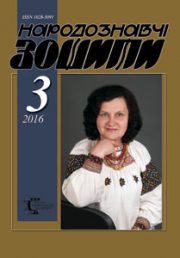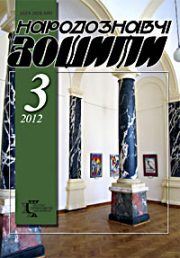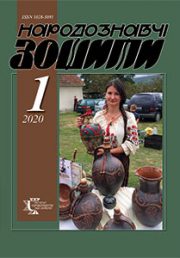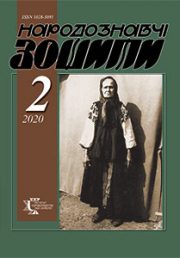The Ethnology Notebooks. 2017, 2 (134), 327—340
UDK 39(4778.8611):[675.02:685]
DOI https://doi.org/10.15407/nz2017.02.327
LEATHER WORKING AND ITS PRODUCTION AT POKUTTIA
Sapeliak Oksana, Candidate of Sciences in History, Senior Researcher
in the department of the modern ethnology
of the Institute of Ethnology of the National Academy of Sciences of Ukraine.
Svobody Avenue 15, 79000, Lviv, Ukraine.
Contacts: e-mail: oksana.sapelyak@gmail.com
ORCID https://orcid.org/0000-0001-8111-6563
Abstract. The article deals with one of the most ancient branches of humans’ activity — leather working. Attention is paid to the development of folk crafts of leather dressing, the technology of leather working and peculiarities of leather goods, both their decoration, at Pokuttia.
Keywords: leather dressing, tanning, bootmaking, furriery, fur production.
Received 20.03.2017
REFERENCES
Archive of the Institute of Ethnology of the National Academy of Sciences of Ukraine. F. 1. Op. 2. Od. zb. 705. 180 ark. (Materialy Oksany Sapeliak) [in Ukrainian].
Andrukhiv, I. & Havryliuk S. (2002). Tysmenytsia. Ivano-Frankivs’k: Lileia [in Ukrainian].
Bazhans’kyj, M. (1983). Tvorchyj dynamizm patriotyzmu moikh zemliakiv. (Vol. 7). Ditrojt: Biblioteka vydavnytstva «Sniatyn» [in Ukrainian].
Herasymovych, I. (1881, 89). Yarmarky i torhy na Pokutti. Dilo [in Ukrainian].
Golovac’kij, Ja. (1848). O kostjumah ili narodnom ubranstvЂ rusinov ili russkih v Galichinѣ i Severovostochnoj Vengrii. Sankt-Petrograd [in Russian].
Horyn’, H. (1896). Shkiriani promysly zakhidnykh oblastej Ukrainy (druha polovyna XIX — poch. XX st.). Kyiv: Naukova dumka [in Ukrainian].
Hospodar i promyslovets’. (1909, 2). [in Ukrainian].
Kapral’, M. (2009). Shevs’kyj tsekh u L’vovi XI—XIII stolit’ i osoblyvosti pravovoho statusu. Visnyk L’vivs’koho universytetu. Seriia istorychna, 44, 39—58 [in Ukrainian].
Koval’chak, H.I. (1960). Rozvytok fabrychno-zavods’koi promyslovosti v Skhidnij Halychyni XIX — na pochatku XX st. In Z istorii zakhidno-ukrains’kykh zemel’. Kyiv [in Ukrainian].
Kotliar, M.F. (1968). Halyts’ka Rus’ u druhij polovyni XIV — pershij chverti XV st. Kyiv: Naukova dumka [in Ukrainian].
Ostapovych, V. (2012). Narysy z istorii sela Hannusivka. Kharkiv [in Ukrainian].
Ryshard-Brykovs’kyj, V. (1981). 100-tu richnytsiu pershoi pol’s’koi etnohrafichnoi vystavky v Kolomyi. Polska sztuka ludowa, 2, 117—121. Wrocław; Warszawa; Kraków; Gdańsk [in Polish].
Sapeliak, O. (2008). Ukrains’ka spil’nota v Arhentini. Istoryko-etnolohichnyj aspekt. L’viv [in Ukrainian].
Stel’maschuk, H.H. (1993). Tradytsijni holovni ubory ukraintsiv. Kyiv: Naukova dumka [in Ukrainian].
Kolberg, O. (1882). Pokucie. Obraz etnograficzny. (Vol. I). Kraków [in Polish].
Mroczko, K. (1897). Snsatyńszczyna (Przyczynek do etnografii krajowej). In Przewodnik naukowy i literacki. Rocznik XXV z 1882. Lwów [in Polish].
Przemysl garbarski. (1928). In Sprawozdanie komisyi ankietowey. (Vol. XV). Warszawa [in Polish].
Seweryn, T. (1924). Koźusznictwo i torebkarstwo w Kosowie. In Przemysł. Rzemiosło. Sztuka. (Rocznik IV. № 2, pp. 3—23). Krakow [in Polish].
Waigel, L. (1877). Rys miasta Kołomyja. Kołomyja [in Polish].







